The participating students conducted over 50 action and outreach projects. Some of these projects are ongoing while others have already been implemented. Here is a small sampling of these initiatives outlined below with pictures.
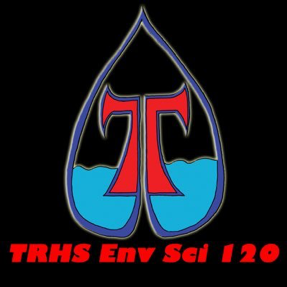 Official project logo of the Environmental Science 120 class Tantramar Regional High School. |
Tantramar Regional H S in Sackville New Brunswick Instead of having a final exam, students from the environmental class completed a final project and they focused on outreach including topics that were covered in the class. The outreach was done in the school and with a few community organizations. The students engaged their audiences through Twitter and created awareness by placing posters around the campus. The Parent School Support Committee were excited about the project. Finally, Catherine Priemer was recognized as a Student of the Year for Grade 11 as a result of her role and involvement in the project as a student presenter for Climate Action 150’s Virtual Town Hall. |
|
École secondaire La Poudrière in Drummondville Québec Students held a conference with the Mayor of Drummondville to talk about how climate change is affecting their community and what actions they are going to take to combat the effects. Students had made posters and flyers of their Inquiry subjects during the conference for the Mayor and other schoolmates to see. After the Climate Action 150 project came to an end, the principal of the school paid a visit to the class and congratulated student writer and presenter Coralie Charland for her outstanding efforts and contributions to the project.
|
|
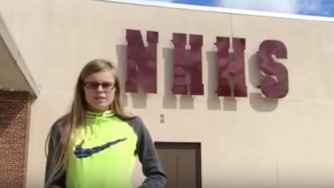 |
North Hastings High School in Bancroft, Ontario - Leaf Worsley’s Class Students from Ms. Worsley’s class sold trees to raise money to host a community meeting on a new green school for Bancroft and to purchase design technology for students to use to make input into a new green school. The students also made a video to talk about their Moonshot Dream School. Watch the video at this link: https://www.youtube.com/watch?v=Eg7WzL5hc8Y |
|
North Hastings High School in Bancroft, Ontario - Andrew Edgar’s Class Students compared the environment policy of Town of Bancroft with other towns in Canada. During the process of this activity, the students built their research skills in finding information and contacting climate experts. |
|
|
Milliken Mills High School in Markham, Ontario The students initiated a number of action projects tied to and because of Climate Action 150. Firstly, they formed a partnership with City of Markham to lead on youth engagement around climate action initiatives of the City, all under the banner of the Milliken Mills High School Climate Ambassadors. To this effect, the students published articles in the local paper. Milliken Mills Climate Action 150 students rolled out the GHG Calculator to their whole school at the beginning of April for the school’s Earth Month. They set up in the school’s atrium getting students to pledge actions that would reduce their GHG emissions on Earth Day. The students then did the same thing at an Earth Month event at Bakersfield Elementary (a nearby elementary school) where Climate Action 150 participants handed out free tree seedlings to elementary school students and their parents who committed to reduce their GHG footprint. To learn more about this project, please contact: Christopher Williams: Christopher.Williams@yrdsb.ca |
|
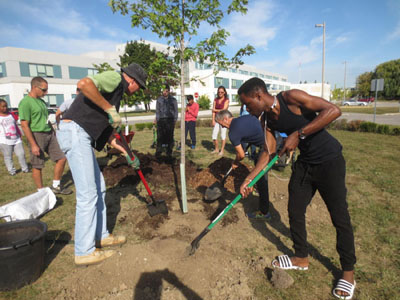 Milliken Mills Climate Action 150 students and Sheridan Nurseries staff planted trees at Milliken Mills. |
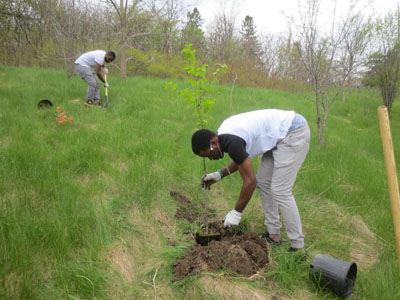 Students planting trees in Pamona Hills Park. |
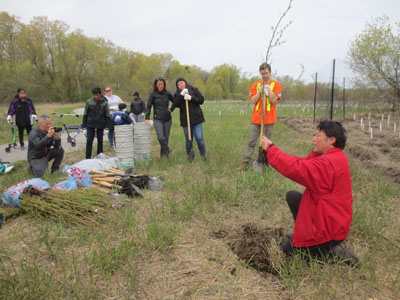 Milliken Mills Climate Action 150 students work with Nory Tokata, Parks Planner for the City of Markham and with special needs students to plant 500 trees at the Campbell Park Habitat Restoration in Markham. |
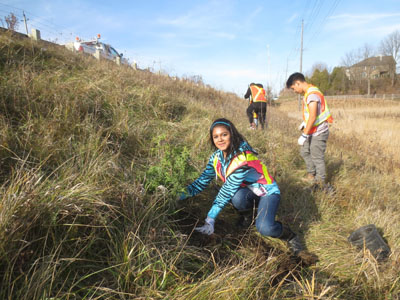 Milliken Mills students work with Ontario Streams adopt-a-stream project, planting shrubs and trees to protect streambanks from erosion. |
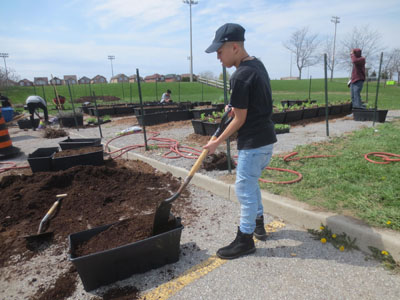 Milliken Mills CA150 students construct a community garden. |
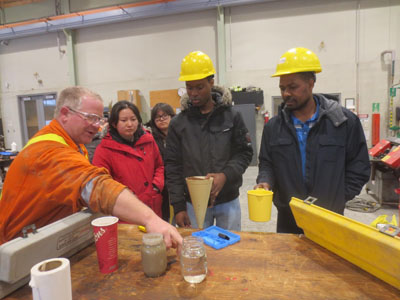 Milliken Mills students research fracking (Fleming College). |
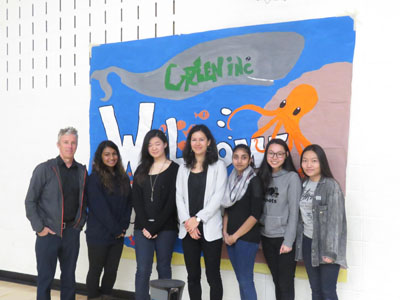 Milliken Mills’ Green Inc. welcomes Sarika Cullis Suzuki to work with CA150 students. |
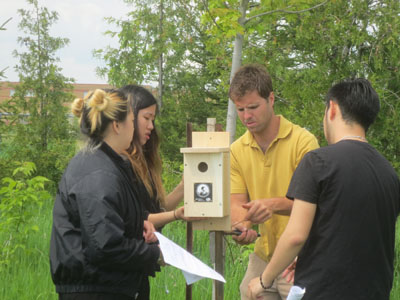 Milliken Mills students install Bluebird houses as part of Fleming College, Dual-credit SHSM Environment in Partnership program Ontario Federation of Anglers and Hunters. |
|
Leamington District Secondary School in Leamington, Ontario 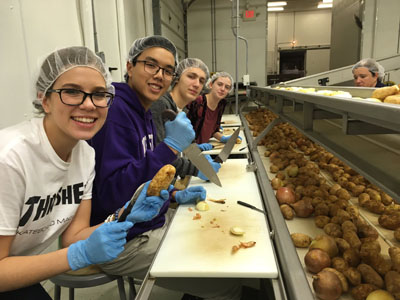
Students at Leamington District Secondary School focused their action project on the topic of food waste. They volunteered at Southwestern Ontario Gleaners, processing unmarketable fruits and vegetables into a dehydrated soup mix that was then made available, free-of-charge to food banks and relief agencies. Just before Climate Action 150 began, the school’s EcoTeam submitted a food waste reduction idea to Ontario Budget Talks. Their idea called for re-examining the best before date labeling in Ontario, encouraging the agricultural industry and supermarkets to sell “less than perfect” produce and educating consumers about better purchasing decisions to reduce food waste at home and in business. Leamington’s input helped put Reducing and Preventing Food Waste in the list of top three ideas, with $600,000 allocated to this. What was so effective about their pitch? Here’s the LDSS Eco Team’s input: “Banning supermarket food waste has been very successful in France and is currently being considered in numerous European countries. The UN has reported that if food waste were a country, it would be the third largest greenhouse gas emitter after China and the US - that puts things in perspective. We have a shared responsibility to meet the UN Sustainable Development Goals to reduce food waste by 50% by 2030. Ontario has done very little to address the food waste issue. In Ontario, we need to re-examine best before date labeling - often food is discarded unnecessarily. The agricultural industry and supermarkets should be encouraged to sell "less than perfect" produce (with small blemishes and irregular shapes) at a reduced cost rather than wasting it. Educating the consumer about this issue is necessary to encourage them to purchase less-than-perfect produce and to reduce food waste at home and in businesses. This will take a re-imagining of the entire food supply system, but it is absolutely worth the effort.” To learn more about this project, please contact Lisa Jeffery at: Lisa.jeffery@publicboard.ca |
|
|
Carman Collegiate in Carman, Manitoba 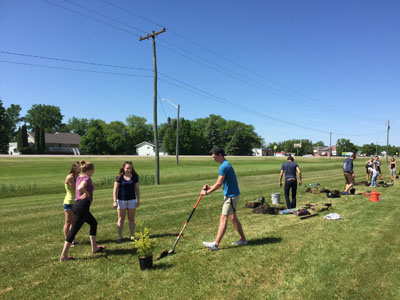
Carman’s Climate Action 150 students planted white spruce trees beside the sports field and track to raise community awareness about climate change. White spruce trees are great at sequestering carbon, which makes them a great choice for the environment. The students also wanted to help combat the effects of erosion due to flooding and took leadership by organizing the planting of trees. The project got the community and younger kids from lower grades involved in watering the trees. One challenge they faced was having to contact hydro to get a permit to plant trees around the track but they students were successful in securing the right documents. 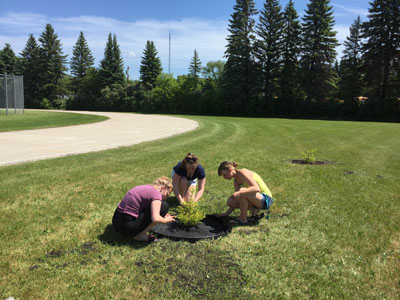
Although the project involved planting trees, it involved making an impact on the school community. The students hope that their action project will spark reactions from all the other students, especially in encouraging the younger students to follow through with the project. In the words of one of the students, “we always talk about doing stuff and never follow through but this time it is actually like we are following through with our ideas.”: If you would like to know more about this project — one you might tackle at your school — please contact Rosanne Massinon at: RMassinon@prsdmb.ca |
|
|
|
|
|
|
|
|
|
|
|
|
|
|
|
|
|
|
|
|
|
|
|
|
|
|
|
|
|
|
|
|
|
|
|
|
|
|
|
|
|
|
|
|
|
|
|
|
|
|
|
|